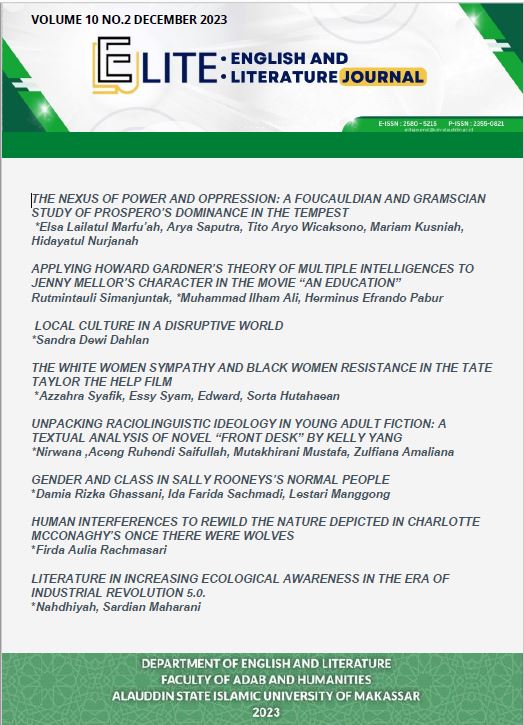UNPACKING RACIOLINGUISTIC IDEOLOGY IN YOUNG ADULT FICTION: A TEXTUAL ANALYSIS OF NOVEL “FRONT DESK” BY KELLY YANG
Abstract
Abstract
This study examines the representation of raciolinguistic ideologies in Young Adult Fiction, with a particular focus on Kelly Yang's novel "Front Desk." The novel, which was published in 2018, serves as a prism through which to examine the interaction between race and language. Raciolinguistic ideologies, as described by Rosa and Flores, pertain to the complex interplay between race and language and how it is actively used to establish and perpetuate social hierarchies and inequalities. This study will use textual analysis to find and examine the linguistic and narrative mechanisms used in "Front Desk" to express and interrogate these raciolinguistic ideologies. The textual analysis results reveal unique linguistic techniques used in "Front Desk," offering light on how characters navigate and negotiate language in connection to their racial identities. The novel's narrative depictions quietly establish and perpetuate racial hierarchies, providing nuanced insights into how language contributes to these social constructions. The research clarifies the novel's portrayal of the progression of individuals' language practices in relation to their racial identities through an examination of character development, providing a greater understanding of raciolinguistic ideologies in narrative form.
Downloads
References
Azhar, I. N. (2022). US Raciolinguistics Heated Discourses: Can They be Brought to Indonesia? Prosodi, 16(1), 1–16. https://doi.org/10.21107/prosodi.v16i1.13410
Barrett, R., Cramer, J., & McGowan, K. B. (2022). English with an Accent. English with an Accent. https://doi.org/10.4324/9781003332886
Bauler, C. (2023). Have We Learned Anything ? Raciolinguistic Ideologies in Remote Learning Public Discourses. 1(1).
Bean, T. W., & Moni, K. (2003). Developing students’ critical literacy: Exploring identity construction in young adult fiction. Journal of Adolescent and Adult Literacy, 46(8), 638–648.
Cushing, I. (2023). Raciolinguistic policy assemblages and white supremacy in teacher education. Curriculum Journal, 34(1), 43–61. https://doi.org/10.1002/curj.173
Cushing, I., & Carter, A. (2022). Using young adult fiction to interrogate raciolinguistic ideologies in schools. Literacy, 56(2), 106–119. https://doi.org/10.1111/lit.12277
Edward Arnold. Yang, K. (2018). Front Desk. Scholastic Press. Rosa, J. & Flores, N. (2017). Unsettling race and language: Toward a raciolinguistic perspective. Language in Society, 46
Flores, N., & Rosa, J. (2015). Undoing appropriateness: Racioling uistic ideologies and language diversity in education. Harvard Educational Review, 85(2), 149–171. https://doi.org/10.17763/0017-8055.85.2.149
Garcia, A. (2013). Critical foundations in young adult literature: Challenging genres (Vol. 4). Sense Publishers
Hess, D. E. (2009). Controversy in the classroom: The democratic power of discussion. Routledge.
Knickerbocker, J. L. (2017). Literature for young adults: Books (and more) for contemporary readers. Taylor & Francis.
MA, K. L. N. (2018). CHANGING NAMES, CHAN GING PLACES: THE TRANSFORMATION OF FEMALE IDENTITY THROUGH TRANSLOCATION IN FOUR NOVELS BY BHARATI MUKHERJEE (Doctoral dissertation, The University of Fiji).
McGill, B. M., Foster, M. J., Pruitt, A. N., Thomas, S. G., Arsenault, E. R., Hanschu, J., … Burgin, A. J. (2021). You are welcome here: A practical guide to diversity, equity, and inclusion for undergraduates embarking on an ecological research experience. Ecology and Evolution, 11(8), 3636–3645. https://doi.org/10.1002/ece3.7321
Mcnair, T. I. A. B. (n.d.). Equity Talk to Equity Walk - Tia McNair PowerPoint.
Naji Meidani, E., & Pishghadam, R. (2012). Analysis of English language textbooks in the light of English as an International Language (EIL): A comparative study. International Journal of Research Studies in Language Learning, 2(2). https://doi.org/10.5861/ijrsll.2012.163
Palinkas, L. A., Horwitz, S. M., Green, C. A., Wisdom, J. P., Duan, N., & Hoagwood, K. (2015). Purposeful Sampling for Qualitative Data Collection and Analysis in Mixed Method Implementation Research. Administration and Policy in Mental Health and Mental Health Services Research, 42(5), 533–544
Pino, J. Del. (2022). Raciolinguistics Through a Historical, Global, and Intersectionality Lens. CATESOL Journal, 33(1), 1–14. Retrieved from https://search.ebscohost.com/login.aspx?direct=true&db=eax&AN=161381702&site=ehost-live
Ramjattan, V. A. (2023). International students and their raciolinguistic sensemaking of aural employability in Canadian universities. International Journal of the Sociology of Language, 2023(282), 159–180. https://doi.org/10.1515/ijsl-2022-0067
Rickford, J. R., & Ball, A. F. (2016). Raciolinguistics: How language shapes our ideas about race. Oxford University Press. Thompson, G. (2014). Introducing functional grammar. Routledge.
Rosa, J., & Flores, N. (2023). Rethinking Language Barriers & Social Justice from a Raciolinguistic Perspective. Daedalus, 152(3), 99–114. https://doi.org/10.1162/daed_a_02020
Rosa, J., & Flores, N. (2017). Unsettling race and language: Toward a raciolinguistic perspective. Language in Society, 46(5), 621-647. doi:10.1017/S0047404517
Subtirelu, N. C. (2020). Raciolinguistic ideology, the Seal of Biliteracy, and the politics of language education. The Seal of Biliteracy: Case studies and considerations for policy implementation, 161-176.
Sun, W., & Wang, X. (2023). A raciolinguistic analysis of the neoliberal promotion of dual language education in a new Latinx South state. Discourse, 44(1), 61–75. https://doi.org/10.1080/01596306.2021.1955242
Taxel, J. (1997). Multicultural literature and the politics of reaction. Teachers College Record, 98(3), 417-448.
Yoshimi, J. (2016). Textual Analysis. SpringerBriefs in Philosophy, 35–37. https://doi.org/10.1007/978-3-319-26698-5_4
Copyright (c) 2023 Nirwana Muhlis, Aceng Ruhendi Saifullah, Mutakhirani Mustafa, Zulfiana Amaliana MZ

This work is licensed under a Creative Commons Attribution-NonCommercial-ShareAlike 4.0 International License.
Once an article was published in the journal, the author(s) are:
granted to the journal right licensed under Creative Commons License Attribution that allows others to share the work with an acknowledgement of the work's authorship.
permitted to publish their work online in third parties as it can lead wider dissemination of the work.
continue to be the copyright owner and allow the journal to publish the article with the CC BY-NC-SA 4.0 license
receiving a DOI (Digital Object Identifier) of the work.


